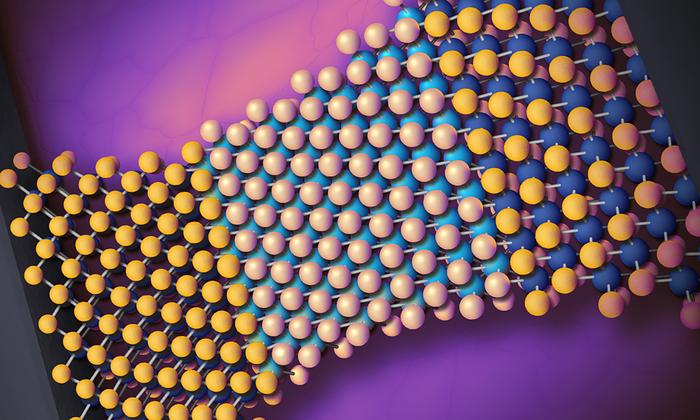By strategically straining materials that are as thin as a single layer of atoms, University of Rochester scientists have developed a new form of computing memory that is at once fast, dense, and low-power. The researchers outline their new hybrid resistive switches in a study published in Nature Electronics.

Credit: University of Rochester illustration / Michael Osadciw
By strategically straining materials that are as thin as a single layer of atoms, University of Rochester scientists have developed a new form of computing memory that is at once fast, dense, and low-power. The researchers outline their new hybrid resistive switches in a study published in Nature Electronics.
Developed in the lab of Stephen M. Wu, an assistant professor of electrical and computer engineering and of physics, the approach marries the best qualities of two existing forms of resistive switches used for memory: memristors and phase-change materials. Both forms have been explored for their advantages over today’s most prevalent forms of memory, including dynamic random access memory (DRAM) and flash memory, but have their drawbacks.
Wu says that memristors, which operate by applying voltage to a thin filament between two electrodes, tend to suffer from a relative lack of reliability compared to other forms of memory. Meanwhile, phase-change materials, which involve selectively melting a material into either an amorphous state or a crystalline state, require too much power.
“We’ve combined the idea of a memristor and a phase-change device in a way that can go beyond the limitations of either device,” says Wu. “We’re making a two-terminal memristor device, which drives one type of crystal to another type of crystal phase. Those two crystal phases have different resistance that you can then story as memory.”
The key is leveraging 2D materials that can be strained to the point where they lie precariously between two different crystal phases and can be nudged in either direction with relatively little power.
“We engineered it by essentially just stretching the material in one direction and compressing it in another,” says Wu. “By doing that, you enhance the performance by orders of magnitude. I see a path where this could end up in home computers as a form of memory that’s ultra-fast and ultra-efficient. That could have big implications for computing in general.”
Wu and his team of graduate students conducted the experimental work and partnered with researchers from Rochester’s Department of Mechanical Engineering, including assistant professors Hesam Askari and Sobhit Singh, to identify where and how to strain the material. According to Wu, the biggest hurdle remaining to making the phase-change memristors is continuing to improve their overall reliability—but he is nonetheless encouraged by the team’s progress to date.
Journal
Nature Electronics
DOI
10.1038/s41928-023-01071-2
Article Title
Strain engineering of vertical molybdenum ditelluride phase-change memristors
Article Publication Date
23-Nov-2023




